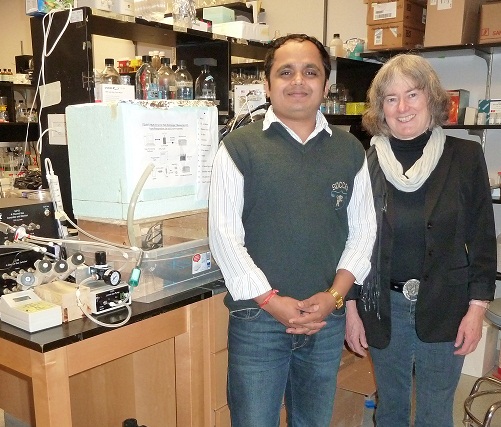Home > Press > Common nanoparticles found to be highly toxic to Arctic ecosystem
 |
| Queen's researchers Niraj Kumar and Virginia Walker with the piece of equipment they used to measure the respiration of microbe communities living in Arctic soil samples. |
Abstract:
Queen's researchers have discovered that nanoparticles, which are now present in everything from socks to salad dressing and suntan lotion, may have irreparably damaging effects on soil systems and the environment.
Common nanoparticles found to be highly toxic to Arctic ecosystem
Kingston, Canada | Posted on April 6th, 2011"Millions of tonnes of nanoparticles are now manufactured every year, including silver nanoparticles which are popular as antibacterial agents," says Virginia Walker, a professor in the Department of Biology. "We started to wonder what the impact of all these nanoparticles might be on the environment, particularly on soil."
The team acquired a sample of soil from the Arctic as part of their involvement in the International Polar Year initiative. The soil was sourced from a remote Arctic site as they felt that this soil stood the greatest chance of being uncontaminated by any nanoparticles.
"We hadn't thought we would see much of an impact, but instead our results indicate that silver nanoparticles can be classified as highly toxic to microbial communities. This is particularly concerning when you consider the vulnerability of the arctic ecosystem."
Dr. Walker further noted that although technological progress is important, the world has a history of welcoming innovations prior to reflecting on their impact on the environment. Such examples include the discovery of the insecticide DDT, the use of the drug thalidomide during pregnancy and the widespread use of synthetic fertilizers.
The researchers first examined the indigenous microbe communities living in the uncontaminated soil samples before adding three different kinds of nanoparticles, including silver. The soil samples were then left for six months to see how the addition of the nanoparticles affected the microbe communities. What the researchers found was both remarkable and concerning.
The original analysis of the uncontaminated soil had identified a beneficial microbe that helps fix nitrogen to plants. As plants are unable to fix nitrogen themselves and nitrogen fixation is essential for plant nutrition, the presence of these particular microbes in soil is vital for plant growth. The analysis of the soil sample six months after the addition of the silver nanoparticles showed negligible quantities of the important nitrogen-fixing species remaining and laboratory experiments showed that they were more than a million times susceptible to silver nanoparticles than other species.
These pioneering findings by Queen's researchers Niraj Kumar and Virginia Walker and Dowling College's Vishal Shah have been published today in the Journal of Hazardous Materials, the highest ranking journal in Civil Engineering.
####
For more information, please click here
Contacts:
Christina Archibald
Communications Officer
613-533-2877
Copyright © Queen’s University
If you have a comment, please Contact us.Issuers of news releases, not 7th Wave, Inc. or Nanotechnology Now, are solely responsible for the accuracy of the content.
| Related News Press |
News and information
![]() Researchers develop molecular qubits that communicate at telecom frequencies October 3rd, 2025
Researchers develop molecular qubits that communicate at telecom frequencies October 3rd, 2025
![]() Next-generation quantum communication October 3rd, 2025
Next-generation quantum communication October 3rd, 2025
![]() "Nanoreactor" cage uses visible light for catalytic and ultra-selective cross-cycloadditions October 3rd, 2025
"Nanoreactor" cage uses visible light for catalytic and ultra-selective cross-cycloadditions October 3rd, 2025
Discoveries
![]() Researchers develop molecular qubits that communicate at telecom frequencies October 3rd, 2025
Researchers develop molecular qubits that communicate at telecom frequencies October 3rd, 2025
![]() Next-generation quantum communication October 3rd, 2025
Next-generation quantum communication October 3rd, 2025
![]() "Nanoreactor" cage uses visible light for catalytic and ultra-selective cross-cycloadditions October 3rd, 2025
"Nanoreactor" cage uses visible light for catalytic and ultra-selective cross-cycloadditions October 3rd, 2025
Announcements
![]() Rice membrane extracts lithium from brines with greater speed, less waste October 3rd, 2025
Rice membrane extracts lithium from brines with greater speed, less waste October 3rd, 2025
![]() Researchers develop molecular qubits that communicate at telecom frequencies October 3rd, 2025
Researchers develop molecular qubits that communicate at telecom frequencies October 3rd, 2025
![]() Next-generation quantum communication October 3rd, 2025
Next-generation quantum communication October 3rd, 2025
![]() "Nanoreactor" cage uses visible light for catalytic and ultra-selective cross-cycloadditions October 3rd, 2025
"Nanoreactor" cage uses visible light for catalytic and ultra-selective cross-cycloadditions October 3rd, 2025
Environment
![]() Researchers unveil a groundbreaking clay-based solution to capture carbon dioxide and combat climate change June 6th, 2025
Researchers unveil a groundbreaking clay-based solution to capture carbon dioxide and combat climate change June 6th, 2025
![]() Onion-like nanoparticles found in aircraft exhaust May 14th, 2025
Onion-like nanoparticles found in aircraft exhaust May 14th, 2025
![]() SMART researchers pioneer first-of-its-kind nanosensor for real-time iron detection in plants February 28th, 2025
SMART researchers pioneer first-of-its-kind nanosensor for real-time iron detection in plants February 28th, 2025
Safety-Nanoparticles/Risk management
![]() Onion-like nanoparticles found in aircraft exhaust May 14th, 2025
Onion-like nanoparticles found in aircraft exhaust May 14th, 2025
![]() Closing the gaps — MXene-coating filters can enhance performance and reusability February 28th, 2025
Closing the gaps — MXene-coating filters can enhance performance and reusability February 28th, 2025
|
|
||
|
|
||
| The latest news from around the world, FREE | ||
|
|
||
|
|
||
| Premium Products | ||
|
|
||
|
Only the news you want to read!
Learn More |
||
|
|
||
|
Full-service, expert consulting
Learn More |
||
|
|
||








